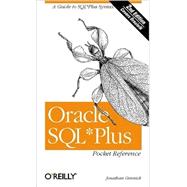
Jonathan Gennick is an O'Reilly & Associates editor specializing in database and programming titles. Prior to joining O'Reilly, Jonathan amassed some 17 years of programming and database management experience. During the latter part of his career he specialized in relational database programming, and more recently in database management. Jonathan got his start with relational database systems in 1990, first working with Ingres, and later with Digital's Rdb software. During that period he developed a fondness for SQL, and for the challenge of applying SQL creatively in ways that leveraged it's set-oriented capabilities. In 1994 Jonathan made the leap to Oracle, and is now often found writing about it. Recent projects include Oracle SQLLoader (O'Reilly & Associates, 2001); Oracle SQLPlus Pocket Reference (O'Reilly & Associates, 2000); Oracle SQL*Plus: The Definitive Guide (O'Reilly & Associates, 1999); More recently, Jonathan has made forays into other database products, coauthoring Transact-SQL Cookbook (O'Reilly & Associates, 2002) and editing Practical PostgreSQL (O'Reilly & Associates, 2002). Jonathan is certified as an Oracle DBA and is a member of MENSA and the Oracle Technology Network. He holds a Bachelor of Arts degree in Information and Computer Science, with a Business Administration minor, from Andrews University in Berrien Springs, Michigan. Jonathan currently resides in Munising, Michigan with his wife Donna and their two children: Jenny and Jeff. Jonathan may be contacted by email at jonathan@gennick.com, and you can learn more about him personally by visiting his website at http://gennick.com.
| Introduction | 1 | (1) | |||
|
2 | (7) | |||
|
2 | (4) | |||
|
6 | (2) | |||
|
8 | (1) | |||
|
9 | (1) | |||
|
9 | (1) | |||
|
9 | (19) | |||
|
10 | (2) | |||
|
12 | (2) | |||
|
14 | (2) | |||
|
16 | (1) | |||
|
17 | (6) | |||
|
23 | (3) | |||
|
26 | (1) | |||
|
27 | (1) | |||
|
28 | (2) | |||
|
28 | (1) | |||
|
29 | (1) | |||
|
29 | (1) | |||
|
30 | (2) | |||
|
31 | (1) | |||
|
31 | (1) | |||
|
32 | (1) | |||
|
32 | (2) | |||
|
32 | (1) | |||
|
33 | (1) | |||
|
34 | (1) | |||
|
34 | (2) | |||
|
36 | (3) | |||
|
37 | (1) | |||
|
38 | (1) | |||
|
38 | (1) | |||
|
38 | (1) | |||
|
39 | (6) | |||
|
39 | (1) | |||
|
40 | (1) | |||
|
40 | (1) | |||
|
41 | (1) | |||
|
42 | (1) | |||
|
43 | (2) | |||
|
45 | (8) | |||
|
45 | (1) | |||
|
46 | (1) | |||
|
47 | (2) | |||
|
49 | (4) | |||
|
53 | (6) | |||
|
53 | (2) | |||
|
55 | (1) | |||
|
56 | (3) | |||
| SQL*Plus Command Reference | 59 | (48) | |||
| Index | 107 |
The New copy of this book will include any supplemental materials advertised. Please check the title of the book to determine if it should include any access cards, study guides, lab manuals, CDs, etc.
The Used, Rental and eBook copies of this book are not guaranteed to include any supplemental materials. Typically, only the book itself is included. This is true even if the title states it includes any access cards, study guides, lab manuals, CDs, etc.